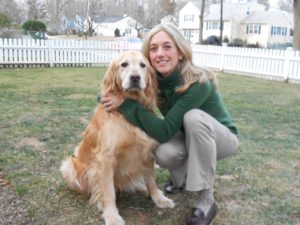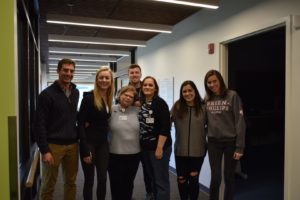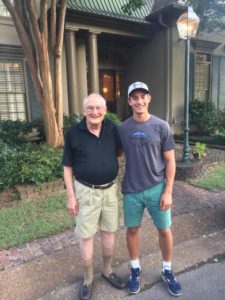Jonah Shainberg interviewed Robin Levine Shainberg, his mom, on her plan for retirement, proactivity in monitoring her health, and comfortability with technology.
- Date: March 5, 2017
- Type: FaceTime Interview
- Location: Lives in Rye, NY
- Team participants: Conducted alone
- User Characteristics:
- Gender: Female
- Age: 50
- Occupation: Elementary school teacher
- Education: B.A. George Washington ‘88, and Manhattanville Master’s in Education ‘06
- Memorable Quotes:
- “I’m more conscious about [my health] now that I can track it, but I haven’t really tracked it much. I walk because I have Leo… it’s a social activity… I meet people and see other dog owners and see the neighborhood. It opens up conversation.”
- “The things I feel like I’m not in control of, I get checked every year.”
- “I’d be willing to help my doctor track my health, and I wouldn’t find it invasive, but I’m not worried about anything because I don’t drink or smoke and I’m aware of how to stay healthy.”
- “I’m a needs-based person.”
- “There’s more knowledge coming out every year and people are more open to discussing health with their family.”
- “I haven’t thought about it yet. I don’t know what my plans for retirement are.”
- “[Moving] depends where you guys are living. I’d want to be close to wherever you guys are. It’s hard to age without a support system”
- Key insights: Some people need to wait for a shock to begin monitoring their health, reliance on others to encourage motivation, each generation handles healthcare differently (culture-wise) too
- Patterns: Another person emphasizing the importance of socialization, the expectation that family cannot provide all the support
How involved are you with your dad’s health right now?
- “He’s also been lucky with his health”
- “I ask how he’s doing all the time”
- “He’s young, he’s 73.”
- “I see more things mentally than physically”
Would you want to be more involved in his health?
- “If Mimi isn’t here. She’s the first line of defense”
- “There’s more knowledge coming out every year and people are more open to discussing health with their family”
How would you help him?
- “I’d start with the doctors he has now”
- “They’ve already been proactive- their building has an elevator and a gym and he doesn’t have to shovel”
- “If he had a medical issue, I’d move him to the Osborn [assisted facility in Rye] but it depends on him because he’s very stubborn”
- “We’ve never talked about it because he’s still young and independent”
Are you technologically savvy?
- “Yes, I am savvy”
- “I know how to download apps”
How do you use technology for your health?
- “I have a Fitbit but I use it in the summer. I also have the Health app on my iPhone”
- “I feel like I’m working most of the time and I know my average habits, don’t need it all the time”
- “I used the nutrition thing and it depressed me”
- “I use other apps for recipes and news”
- “I look at it all the time to see what I did during the week. I walked 7 miles per day at ND over JPW!”
- “I’m more conscious about it now that I can track it, but I haven’t really tracked it much. I walk because I have Leo… it’s a social activity… I meet people and see other dog owners and see the neighborhood. It opens up conversation”
What would you like to do for your health in the future?
- “even now I’m trying to eat more salad and do more things. I make an attempt to eat healthy and enjoy treats in moderation”
- “the things I feel like I’m not in control of, I get checked every year” (cancer)
How often do you exercise?
- “Everyday. I walk 3 miles per day and I have an active job, plus pilates once per twice per week”
Would you like your doctor to be more proactively involved in your day-to-day health?
- “I don’t have a good relationship with my doctor… I doubt she’s missing me”
- “If I got an email saying it’s time for my checkup, I’d like that”
- “I wouldn’t mind sending my Fitbit data to the doctor to track it”
- “I’d be willing to help my doctor track my health, I wouldn’t find it invasive, but I’m not worried about anything because I don’t drink or smoke and I’m aware”
- “I’m a needs based person”
How often do you see a doctor?
- “Once every two years for a regular doctor because I consider myself healthy plus specialists once per year”
Do you think about your health often?
- “I think about it all the time. My mother died when she was 5 years older than me. Could I eat more fruit? Yes. Could I eat less candy? Yes. But that’s why I walk a lot and monitor my diet”
- “all the moms who are home all those years play yoga and have routines but I work and watched you guys and walk the dog”
- “exercise is social and I like that”
What are your plans post-retirement?
- “I haven’t thought about it yet. I don’t know what my plans are”
- “It depends where you guys are living. I’d want to be close to wherever you guys are. It’s hard to age without a support system”
- “Avoid the sandwich generation”
- “I wouldn’t keep anything from parents or children. That doesn’t benefit anybody”
- “I’d wait until I had a complete story about my health. Doesn’t help anyone to worry”


